
As organizations worldwide rushed to jump on the generative AI bandwagon, AI expert Anurag Bhagat's fifteen-year journey in artificial intelligence offers crucial insights. "The challenge isn't about having the most advanced AI technology—it's about making that technology work in real-world business contexts, especially for organizations that might not have extensive technical teams," he reflects.
Back in 2010, when artificial intelligence was still met with skepticism, he looked beyond and pursued a career in practical applications of AI—a decision that would prove to be both bold and well-executed. Now a senior strategist at AWS's Generative AI Innovation Center, Anurag Bhagat shares, "I saw this coming over a decade ago when AI was still considered a niche technology, primarily for the geeks."
Early Vision in a Pre-AI World
Anurag Bhagat demonstrated exceptional promise early on, ranking in the top 0.01% among 600,000 students in the IIT-JEE entrance exam to study Computer Science at the Indian Institute of Technology Kanpur. His academic background laid the foundation for his work in AI. During this time, machine learning was still confined largely to research laboratories. Long before ChatGPT captured the public imagination and generative AI became a boardroom buzzword, Anurag Bhagat was already developing AI algorithms at IBM's Research Lab in Delhi and participating in the Special Interest Group in Machine Learning(SIGML) over the summer break.
Anurag Bhagat's work on pathology detection through infant cry analysis and speech correction algorithms showed he deeply understood AI's practical applications—a perspective that would later prove invaluable. As the industry began to recognize AI's potential, Anurag Bhagat was already translating theoretical concepts into practical business solutions. Through roles at Opera Solutions and Kepler Cannon, he successfully turned complex AI concepts into tangible business outcomes.
His team's development of automated recommendation systems for a major frozen food manufacturer demonstrated AI's potential for large-scale business applications. This work alone resulted in millions in additional revenue. This was one of the examples of how, throughout his career, he would help companies across industries boost their income.
Global Impact Across Six Continents
Building on his initial success, Anurag Bhagat took his expertise worldwide during his eight-year tenure at McKinsey & Company. His work across six continents—from metals and chemicals to oil & gas and power & utilities—demonstrated AI's versatility in solving complex industrial operational challenges. This included manufacturing, procurement, and supply chain management.
As a globally renowned AI expert, he has led teams of data scientists, engineers, and industry experts, regularly advising C-level executives (CEOs, CTOs, CIOs) on AI strategy and implementation. He designed multiple AI-based real-time process control systems that generated recommendations on an hourly basis to improve operations.
"What distinguishes successful AI implementations is their scalability and sustainability," Anurag Bhagat notes. "Recent McKinsey estimates suggest generative AI could add between $2.6 trillion to $4.4 trillion annually to the global economy by 2030. But these numbers only materialize if organizations can effectively implement the technology and integrate them in business processes. That's the real challenge."
Anurag Bhagat's approach focuses on three key principles: practical application, scalable solutions, and sustainable implementation—particularly valuable for organizations without extensive technical teams. At AWS's Generative AI Innovation Center, he blends technical expertise with business acumen to guide organizations through these very challenges of AI adoption and scaling.
Anurag Bhagat Favors Practical Implementation
Anurag Bhagat is among the top global AI experts who can navigate both technical complexities and business requirements. His work's significance is made clear by the White House's recent inclusion of AI and advanced manufacturing in its Critical and Emerging Technologies (CET) list.
"The next phase of AI isn't just about developing new algorithms or Large Language Models," Anurag Bhagat explains. "Real innovation lies in making existing AI technologies work effectively in complex business environments."
As businesses adopt AI across industries, Anurag Bhagat keeps his focus on practical results over theory.
"When I look at my impact over the years—from helping organizations achieve hundreds of millions in value to shaping how entire industries approach AI—I'm most proud of building solutions that last," Anurag Bhagat reflects. "The real measure of success is creating solutions that keep delivering results long after the initial implementation."




